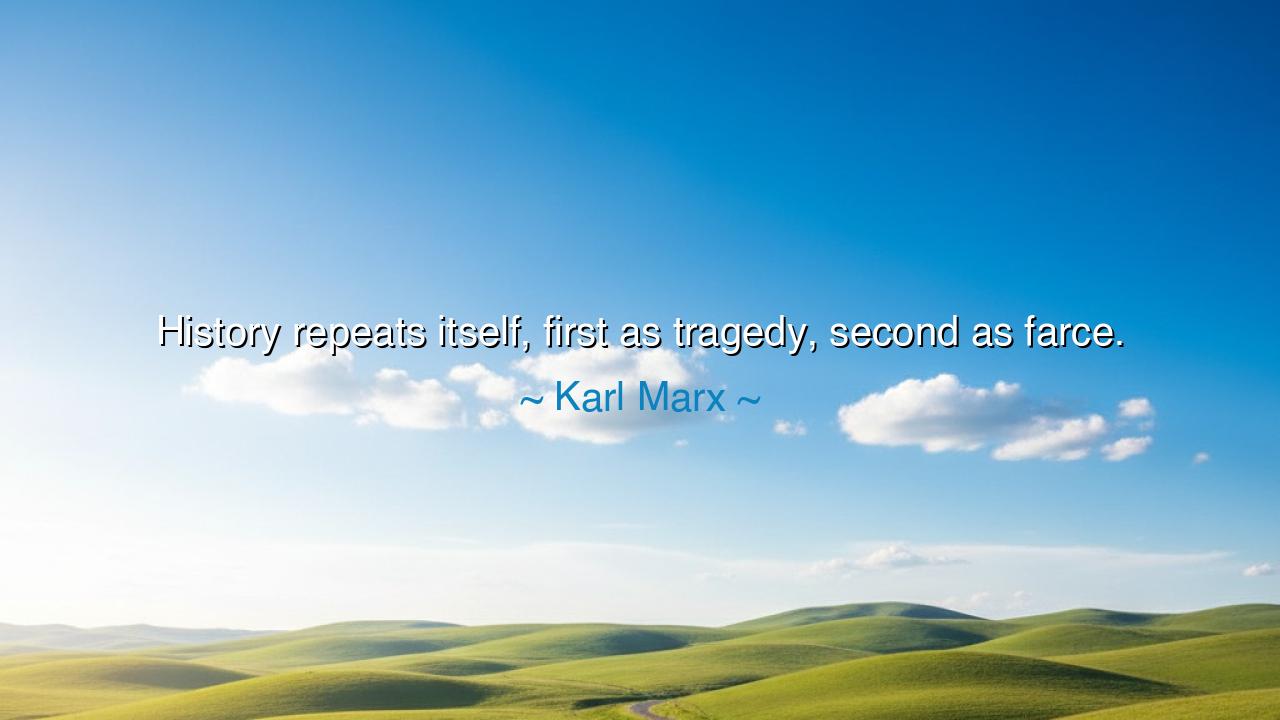
History repeats itself, first as tragedy, second as farce.






“History repeats itself, first as tragedy, second as farce.” So spoke Karl Marx, the philosopher of revolution and the chronicler of human folly. His words are both lament and revelation, for they unveil a pattern woven deep within the fabric of human time—the tendency of mankind to stumble upon the same stones, to reenact the same dramas, and to learn too little from the ruins of the past. In this single sentence, brief yet profound, Marx captures the eternal rhythm of civilization’s rise and fall, its glory and its shame.
In its first movement, history comes as tragedy—majestic, terrible, and filled with consequence. In these moments, nations burn, empires crumble, and the hearts of men are weighed down by grief. Tragedy is born when the proud fall through blindness, when the just are silenced, and when destiny exacts its toll. It is solemn, heroic, and fateful. But when the same errors return, not as sacred suffering but as mockery—when men repeat the same mistakes not out of ignorance but out of vanity—then history becomes farce, a hollow echo of what once was noble. Thus, Marx warns us that the greatest insult to the past is not forgetting it, but imitating it without wisdom.
The origin of this truth lies in Marx’s reflection upon France’s revolutions. He saw how the thunder of 1789, with its cries for liberty and blood-soaked banners, was reborn in 1851 as the shallow theater of Louis-Napoléon Bonaparte’s coup. Where once stood the titans of revolution—Robespierre, Danton, and the storming masses—now strutted imitators, men who borrowed the costumes of the past but none of its courage. The tragedy of the first revolution became the farce of the second. What was once an act of destiny became a play of deceit. Thus, Marx saw in mankind a curse: the tendency to mimic the gestures of greatness without embodying its spirit.
This pattern is not confined to France. Look through the corridors of history and you will see it everywhere. Rome, in its youth, was a republic forged in valor and discipline. Yet centuries later, it parodied its own greatness—the emperors dressed in the garb of old heroes, the Senate bowed in empty ceremony, and the people traded liberty for bread and spectacle. The tragedy of Rome’s fall became the farce of its imitation. And in every age thereafter, men have built their little Romes, repeating the same errors beneath new banners, believing themselves original while walking in circles drawn by their forebears.
Yet we must not despair at this repetition. The wise understand that history repeats not because fate mocks us, but because humanity forgets. Forgetfulness is the true author of farce. When a people cease to remember the cost of their freedom, they play at revolution without understanding its pain. When a generation inherits peace and mistakes it for permanence, they jest with the fires that once consumed nations. Thus, to remember deeply—to learn from both the tragedy and the laughter—is to break the cycle and step beyond mere imitation.
There is wisdom, too, in recognizing that every farce begins as a failure of sincerity. When we repeat the words of the past without feeling their weight, we hollow them out. When we speak of justice but seek comfort, when we honor heroes but do not follow their path, we turn the sacred into satire. Therefore, the task of each soul is to ensure that what was once tragic does not become absurd through our indifference. Let memory be a living flame, not a faded page.
The lesson, then, is this: study the past not as a museum, but as a mirror. Do not merely know what happened; understand why it happened. Question the motives, the silences, the blindness of those who came before. And when history begins to rhyme once more, do not laugh with the crowd—stand apart, remember, and act with conscience. For those who see the pattern yet refuse to change it become the jesters in time’s cruel play.
So, my children, remember this teaching: let tragedy teach you, lest you become its parody. Live with awareness, learn from the ashes of the past, and do not wear the mask of wisdom without the heart of it. Only those who remember can redeem the cycle. Only those who act with understanding can transform repetition into renewal. Let not your age be a farce to those who come after, but a testament that at last, humanity remembered—and learned.






AAdministratorAdministrator
Welcome, honored guests. Please leave a comment, we will respond soon